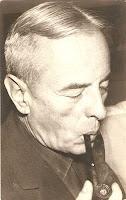 Witold Gombrowicz
Witold GombrowiczMartin Walser interviewed by Alexander Görlach on 'the old wound of lacking justification': 'The authors Franz Kafka and Karl Barth have quite a bit to say on that question.'
On Aussie radio, Alan Saunders interviews Henry Sussman about Kafka and philosophy.
Zdenka Pregelj on 'Kant's Aesthetics in Dostoevsky's Notes from Underground'
'[William] Gass is also a philosopher. He did his graduate work at Cornell after serving in the Navy for three years during World War II, and it was there, during a meeting of the Philosophy Club, that a shabby visitor who gave the impression of being an “atheistical, vegetarian nut” began speaking, and proceeded to offer the young William Gass what he would later cite as the most important intellectual experience of his life. With his conversation, this visitor, who happened to be Ludwig Wittgenstein.'
A Guardian list of philosophical novels. From 2010, Rebecca Goldstein's top five 'novels of ideas'.
Jennie Erdal's April 7 article on whether it's still possible to write a philosophical novel; a central European response. And James Ryerson's Jan., 2011 NY Times article on this topic (with much about David Foster Wallace).
Milan Kundera in a 1989 interview (first published in Review of Contemporary Fiction): 'I’m not thinking of the so-called "philosophical novel" that really means a subordination of the novel to philosophy, the novelistic illustration of ideas. This is Sartre. And even more so Camus. La Peste. This moralizing novel is almost the model of what I don’t like. The intent of a Musil or a Broch is entirely different: it is not to serve philosophy but, on the contrary, to get hold of a domain that, until then, philosophy had kept for itself.'
From an IEET blog, 'The Hierarchy of Exclusion in “Ender’s Game” — a starting point for thinking about personhood'
